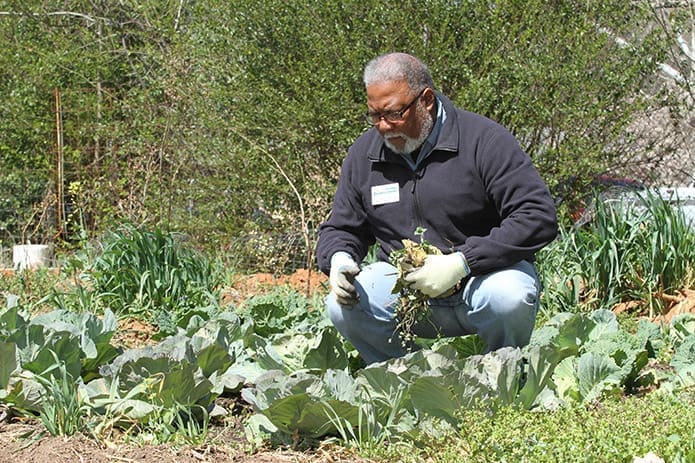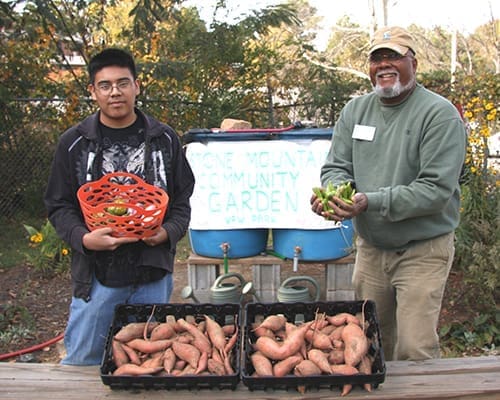 Photo by Michael Alexander
Photo by Michael Alexander
Stone Mountain
Parishes Find Vitality In Caring For Creation
By ANDREW NELSON, Staff Writer | Published March 28, 2013
STONE MOUNTAIN—Columbus Brown has traveled to Jamaica to serve poor people but working on a community garden revealed a need here.
“It reminded me that I can go on a mission many miles away, but there is so much need right in front of my eyes. I just need to remove the plank from my eye,” said Brown, one of the organizers behind the two-year-old garden.
Now, parishioners at Corpus Christi Church are harvesting cabbage, broccoli, turnips and other cold-weather produce at the Stone Mountain Community Garden at VFW Park.
Much of the fresh food goes to the food pantry at the Stone Mountain First United Methodist Church, providing healthy produce to poor families. The food is popular and is picked up almost immediately.
In 2012, 1,400 pounds of food from this garden went to help those in need.
It is just one example of how some Catholic parishes are taking seriously the effort to care for the Earth.
On April 21, the Archdiocese of Atlanta marks Catholic Earth Day, hosted by Ignatius Retreat House, 6700 Riverside Drive, Atlanta. It is the fourth annual celebration at the retreat center. The free event runs from 2 p.m. to 6:30 p.m.
This year’s event is focused on daily actions people and communities can take to protect the Earth’s climate on a local level. The religious community is encouraged to act based on the pillars of spirituality, stewardship, justice and advocacy.

Giovanny Campa, left, and Columbus Brown stand in the food pantry section of the Stone Mountain Community Garden with some of the vegetables grown in the garden. Over 1400 pounds of fresh produce was grown in the garden during 2012. Photo Courtesy of Columbus Brown
Catholic Earth Day is an opportunity to understand the connection between faith and conservation and find simple ways to care for creation every day, said Amy Edwards, one of its organizers.
Catholics understand the message of loving God and all of God’s creation, so she is hopeful that the next step for parishes and individuals is to link faith and conservation, which is simply prudent living, she said.
Some parishes have undergone an energy audit to see where they can save money and use less energy; others formed a green ministry or installed water-saving low-flow toilets.
Edwards and her husband took on the recycling for cash program at St. Thomas the Apostle Church, Smyrna.
It collects about $500 per year, which is used by the local St. Vincent de Paul chapter for necessary items for those in need, from prescription co-pays at the pharmacy and gas vouchers to money to wash and dry clothes or purchase bus passes.
At St. Patrick Church, Norcross, “trees of faith” were recently planted to replace six old and diseased trees.
“Our hope is to bring awareness to care for the environment we have been given, and that it is our responsibility to leave it better than we found it, so that it can be enjoyed for generations to come,” said Father Refugio Onate, pastor of the church.
Some 15 trees, including magnolias, cherry oaks and crape myrtles, were blessed and planted on Jan. 18 at in a bilingual prayer service. Parish ministries are tending to the wellbeing of the trees.
The trees need to be nurtured, just like a person’s faith needs to be taken care of to thrive, Father Onate said in an email.
The Corpus Christi community garden sits on what was at one time a little used baseball field at the park, which is owned and maintained by the city of Stone Mountain. There are about 45 individual plots. There’s a special section reserved for the food pantry.
“We’ve provided some healthier food,” said Brown, who is trained as a master gardener. “It’s absolutely fresh, no pesticides, no chemicals. We deliver food two or three times a week (to the pantry).”
Brown, 64, a retired biologist and administrator for the U.S. Fish and Wildlife Service, also organizes gardening classes hosted by the parish, some drawing up to 50 people. As part of his sales pitch to encourage participation, he tells people none of the food will go to waste.
If people grow more than they can eat, the surplus food can be shared with the poor, he said.
“We can do more, we can do better,” he said.